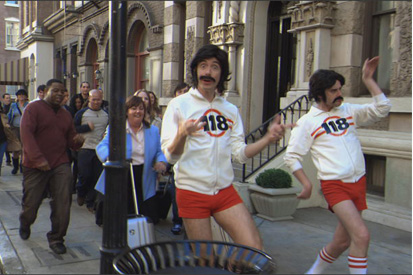The 2003 deregulation of the directory-enquiries market which ended BT's monopoly was meant to be a 'big bang' providing consumers with greater choice.
With as many as 30 companies entering the fray, it soon became clear that, of all the replacement six-digit permutations prefixed with the numbers 118, BT would not be the one that gained the most traction, despite the fact that most of its rivals were charging more. That accolade went to The Number and its 118 118 service, promoted by a memorable campaign created by WCRS and featuring the two moustachioed runners who remain the faces of the brand. After 18 months, BT and The Number controlled 67% of the £300m market between them; this has now grown to a shared 80% control.
However, with the land-grab now over, recent turmoil at The Number, which culminated in this month's departure of its chief executive, the former Superdrug marketer Gerry Murphy, suggests that the company is no longer the powerhouse it once was.
Indeed, his exit coincided with a 50% hike in the cost of using The Number's basic service.
Power of marketing
Murphy's departure comes one year after his predecessor, Mark Horgan, left the company when his job was made redundant. The Number claims Murphy left as his contract had ended. However, the journey that the company has been on shows the power of marketing and how a service that should be on its knees has evolved to remain relevant to consumers without smartphones.
As early as 2006, regulator Ofcom noted that there had been a decline in the use of directory-enquiries services. This started before liberalisation, as consumers used other methods to get the phone numbers they required, such as the internet. Meanwhile, the expansion of mobile phone memories meant that people could now carry around their own directories.
The increased penetration of the internet - added to the fact that the services cannot provide numbers for mobiles - means that calls to directory enquiries have fallen from 1bn a year when the market was deregulated to just 200m in 2009.
Nonetheless, the business remains viable and profitable, albeit in decline, and 118 118 and BT are still dominant despite neither being the cheapest.
According to Craig Mawdsley, joint head of planning at Abbott Mead Vickers BBDO, which handles BT's 118 500 service, the survival and relative success of 118 118 is due to a big initial marketing investment and the fact that it has stuck with its 'runners' strategy. He acknowledges that there are easier ways to get numbers, but says that consumers' behaviour is ingrained.
Mawdsley also notes that the market leaders have developed clear strategies for their businesses, with BT focusing on quality of service while 118 118 has diversified into an information portal.
'The game has changed from the establishment of the brand to managing maturity and decline,' he says. 'While it may never be as famous and big a success again - remember the 118 runners were the meerkats of their day - the 118 118 marketing legacy has been to create a remarkably persistent and profitable business, despite long-term volume decline.'
Against all odds, the continued existence of these services - and the fact that others still try to challenge the two market-leaders' stranglehold - testifies to the ability of focused marketing to provide long-term value for a business. This is surely food for thought for anyone thinking of writing off 118 118.


